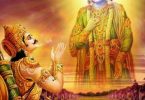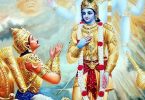Question: Kala or time is said to be eternal. During creation, time exists. At annihilation, when the Universe is withdrawn with the body of Maha Vishnu, does time exist then? With everything being in a state of flux, there should be no change. Change is the effect of time. Without the effect what happens to the cause?
The 37th verse of Brahma Samhita refers to a transcendental time. Is this transcendental time due to the variegatedness and ever increasing mellows in Goloka Vrindavana?
Answer by Romapada Swami:
Kala or time is an energy of the Supreme Lord. When the cosmic manifestation is withdrawn, the energies of creation still exist, but are in a dormant state called avyakta. Time energy continues to exist as well. It’s action is likewise withdrawn, but it continues existing. It is again released or set forth at the time of creation along with the glance of Maha Visnu when He glances over the pradhana.
The 37th verse of Brahma Samhita is speaking of another feature of time, namely the feature of eternal time as we find it in the spiritual world. The evidence of past, present and future as we know it is conspicuous by its absence.







